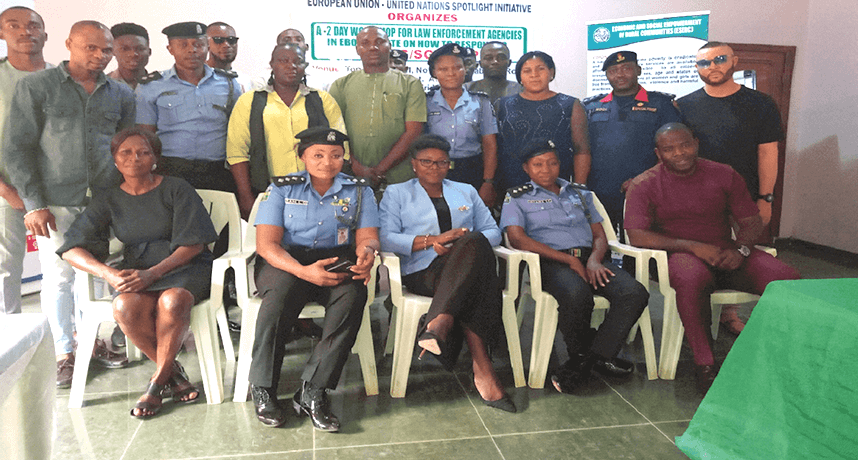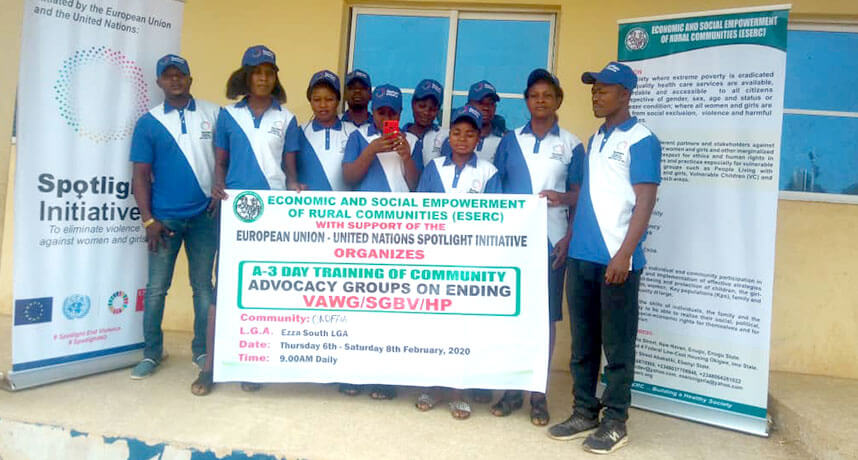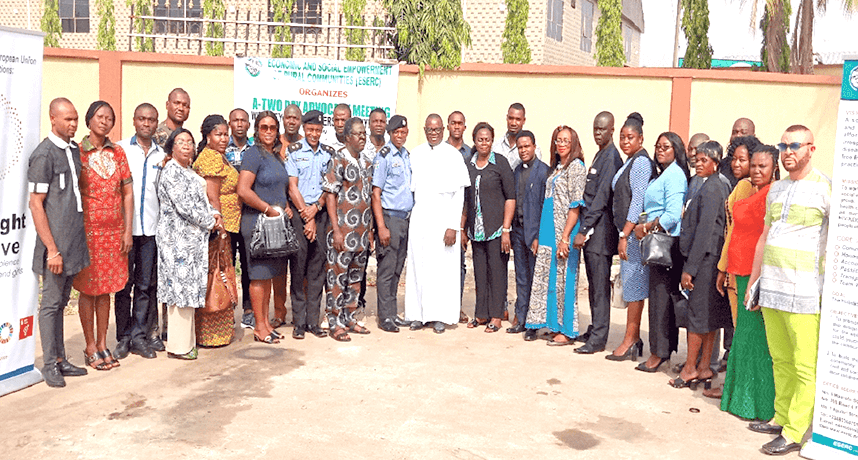Areas of Focus

The following are ESERC’s main areas of focus:
HIV Prevention:
One of the core areas of ESERC is HIV prevention for the following target groups:
• Key Populations (PWIDs, MSM and FSW)
• Women and children
• Youths
• PMTCT
• Men of reproductive age.
ESERC vision is to see a Nigeria where there is zero HIV new infections, zero HIV related
deaths and zero stigma and discrimination against People Living With HIV (PLHIV).
Child Care Centers
ESERC is at the forefront of assisting communities to establish quality early Child care
centers. These centers are cost effective and community managed with affordable, high
quality childcare for poverty ridden communities. These centers target children 0-8 years.
It also includes early intervention for children with disabilities. This programme is child
centered and culturally appropriate.
Toy and Educational Resource Materials
ESERC toy and educational resource library is a programme designed to be the treasure throve
of educational play resources for young children to enhance their development. It is also
designed as a resource center for parents, students, teachers, care givers and
organizations.
Child Rights
ESERC advocates, promotes and protects the rights of the child using relevant laws and
instruments, and offers legal aid in the area of juvenile justice. It campaigns against
juvenile delinquency and child abuse.
Orphan And Vulnerable Children
Orphan and Vulnerable Children are those who have lost one or both parents because of AIDS.
In most cases, they are young children needing care. They are vulnerable because they are
often neglected and uncared for by the society.
Nigeria, with an increasing prevalence of HIV/AIDS, has over one million orphans arising
from AIDS - related deaths of mothers or both parents. According to National Plan of action
2006 - 2010 an orphan is defined as a child below the age of 18 years who has lost one or
both parents irrespective of cause of death. In almost all the local government areas of
Enugu State, these orphans are discovered to be more prone to ill health, had less access to
health care and missed meals more frequently and were more likely to miss school, or not go
to school. This leaves them on their own, leading to an endemic of orphan-headed households.
Most of them leave school to fend for themselves which make them lose the potential for
economic empowerment that education can provide; some get involved in transactional sex or
prostitution just to survive. These groups of children can therefore be said to be more
vulnerable. A vulnerable child according to the National Guideline is one who because of
circumstances of birth or immediate environment, is prone to abuse or deprivation of basic
needs, care and protection, and thus disadvantaged relative to his or her peers.
Based on a set of criteria when compared to other children, vulnerable ones face substantive
risk of suffering significant physical, emotional or mental harm that make their rights not
being result in their human fulfilled
ESERC is offering 6+1 OVC services to 521 OVC in Nike community of Enugu State and is being
supported by Management Sciences for Health (MSH). She has about 150 OVC in Mburumbu
community of Nkanu West Local Government Area of Enugu State.
Women's Rights and Gender Education
Mothers are the first teachers of every child. ESERC designs programmes that empower and
develop women and make them able to perform this creditably. ESERC also advocates for gender
equality and equity; and believes in the mainstreaming of gender equality in the development
process as a strategy for women development and for the benefit of the girl-child. ESERC has
gender education as a cross-cutting issue in her programmes and projects.
Community Empowerment Programmes
In African society, parents, the family and the community owe a duty to the child. The child
does not belong to the parents alone. Everyone in the community renders a helping a hand in
the upbringing and training of the child.
In order to empower the individual, the family and the community to carry out their duties
towards the child, and reduce poverty, ESERC set up integrated agriculture and micro-credit
schemes, and skill acquisition projects for women, youths and men and educates them on their
socio-economic rights.
Youth Education and Development/Youth and Adolescent Reproductive Rights/
HIV/AIDS
Adolescence is a time when youths start learning a great deal about themselves,
relationships with others and their rights and responsibilities. It is also a time of
confusion that may lead to delinquency if they are not properly handled.
ESERC develops programmes for adolescents and youths for their development and empowerment
that will ultimately help them to be responsible and productive citizens.
Such programmes include, reproductive health education, HIV/AIDS, leadership skills
development vocational skills, human rights education, civic education, micro-credit and
financial managem
Good governance, human rights and development
Good governance and human rights are mutually reinforcing. Human rights principles provide a
set of values to guide the work of governments and other political and social actors. They
also provide a set of performance standards against which these actors can be held
accountable. Moreover, human rights principles inform the content of good governance
efforts: they may inform the development of legislative frameworks, policies, programmes,
budgetary allocations and other measures.
On the other hand, without good governance, human rights cannot be respected and protected
in a sustainable manner. The implementation of human rights relies on a conducive and
enabling environment. This includes appropriate legal frameworks and institutions as well as
political, managerial and administrative processes responsible for responding to the rights
and needs of the population.
The interconnection between good governance, human rights and sustainable development has
been made directly or indirectly by the international community in a number of declarations
and other global conference documents. For example, the Declaration on the Right to
Development proclaims that every human person and all people "are entitled to participate
in, contribute to, and enjoy economic, social, cultural and political development" (article
1). In the Millennium Declaration, world leaders affirmed their commitment to promote
democracy and strengthen the rule of law as well as to respect internationally recognized
human rights and fundamental freedoms, including the right to development.
According to the United Nations strategy document on the millennium development goals
(MDGs), entitled "The United Nations and the MDGs: a Core Strategy', "the MDGs have to be
situated within the broader norms and standards of the Millennium Declaration," including
those on "human rights, democracy and good governance."
ESERC carries out Community Human Rights Education to educate the people on their rights,
with particular reference to the rights of vulnerable groups such as children; women,
orphans and vulnerable children, people with disability people living with HIV/AIDS and
other voiceless group.
Monitoring and Evaluation
Monitoring and evaluation are tools that make it possible to identify and measure the
results of projects, programs or policies A continuous data collection and analysis process
is implemented to assess a project (a program or a policy) and compare it with the expected.
Performance
A systematic and objective measurement of the results achieved by a project, a program or a
policy, in order to assess its relevance, its coherence, the efficiency of its
implementation, its effectiveness and its impact, as well as the sustainability Since 2006,
apart from other monitoring and evaluation activities carried out, ESERC has been involved
in the Monitoring and Evaluation of MDG-DRG funded programmes and projects in Imo State,
Nigeria with support from Office of the Senior Special Assistant to the President on MDGs.



